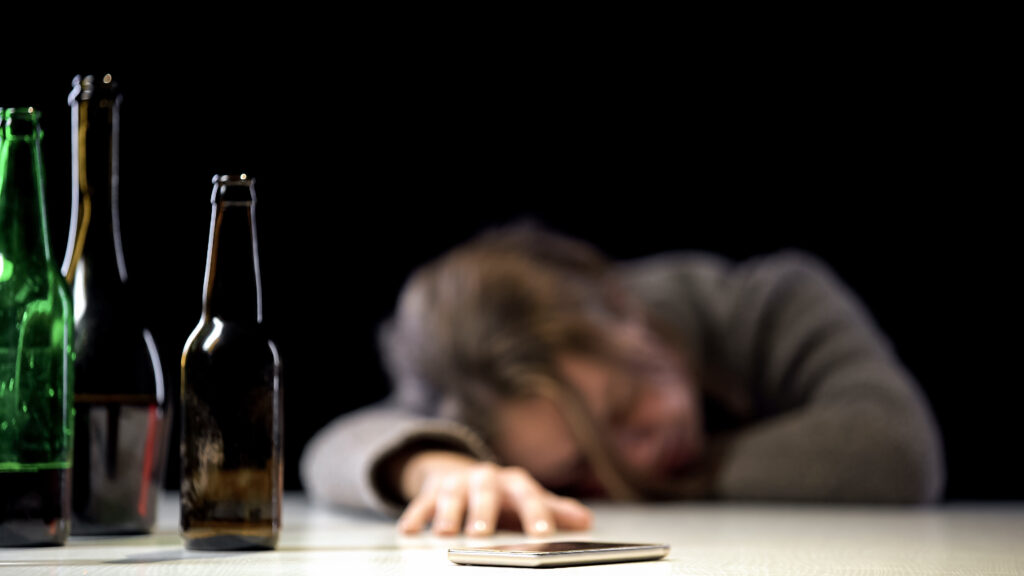Alcohol use is commonplace in the United States and has become a part of our social fabric. According to information provided by the National Institute of Alcohol Abuse and Alcoholism, 219.2 million people ages 12 and older reported that they drank alcohol at some point in their lifetime. While alcohol is legal and widely available, it is far from being a “safe” drug. When misused, alcohol can cause a wide range of physical and mental health issues. Regarding mental health and alcohol, a common question asked is can alcohol cause depression?
In this article, we will discuss what alcohol does to the body and learn the connection between alcohol and depression. Can drinking cause depression? Are you struggling with both alcoholism and depression? If alcohol is ruining your life, today is the day you start on the road to recovery. Thrive Treatment’s alcohol rehab programs will help you uncover the underlying causes of your drinking and give you the tools you need to overcome alcohol once and for all.
The Effects of Alcohol on the Brain
Before we can answer the question, can alcohol cause depression, we first must learn the effects of alcohol on the brain. Alcohol is a drug that immediately impacts brain chemistry. First, the effects users feel when they drink alcohol are positive because of the release of neurotransmitters such as dopamine and GABA throughout the brain. These brain chemicals promote feelings of contentment, happiness, and well-being.
However, those positive feelings decrease over time. In a short period, users gain a tolerance towards alcohol. As a result, users must drink greater amounts to achieve the pleasurable effects they desire. Over time, the brain will stop making dopamine, GABA, and other neurotransmitters and will rely on alcohol for production. If a user curtails their drinking or stops drinking altogether, these neurotransmitters will be low, and users often feel depressed as a result.
Can Alcohol Cause Depression?
In the previous section, we discussed how alcohol takes over neurotransmitter production from the brain. Alcohol is a drug that strengthens one’s emotions. If someone is feeling “down in the dumps” when they consume alcohol, those feelings intensify once the effects of alcohol take effect. Alcohol often causes people to engage in “negative emotion meltdown,” and what was an attempt to cope with their feelings only makes what they feel worse.
Alcohol also causes depression because it robs people of the quality sleep they need to function at normal levels. People may drink to feel asleep, but alcohol in itself disturbs REM sleep which is the time of night when the body recharges itself. As a result, people wake up feeling tired, which can lead to down moods. If people are using drinking as the primary coping mechanism to deal with daily stress, this leads to a gradual decline in their mental health.
Depression can surface for some time when people quit drinking for good. As already stated, this is due to the artificial “boosting” of neurotransmitters from alcohol and the struggle of the brain to produce these chemicals on its own. While the brain will eventually be able to resume production of these “feel good” neurotransmitters, there may be instances where depression may be harder to shake. The following are common symptoms of clinical depression:
- Reduced energy
- Sleep problems
- Changes in appetite
- Disinterest in activities and hobbies
- Hopelessness
- Thoughts of self-harm or suicide
If one is feeling symptoms of depression along with alcohol abuse, they are experiencing what is known as a dual diagnosis. Dual diagnosis is difficult to treat and will require specialized help.
Can Drinking Cause Depression? Yes, It Can But Thrive Treatment Can Help!
Depression and alcohol go hand in hand, and the effects are devastating to one’s physical and mental health. If you or a loved one are struggling with this two-headed monster, the help you need is one phone call away. As one of Southern California’s premier treatment facilities, Thrive Treatment features evidence-based treatment that is proven to work and is customized to meet your specific needs. Thrive Treatment is a Los Angeles drug rehab center that can help you overcome addiction. Contact us today to learn more about our alcohol addiction treatment program in LA.





